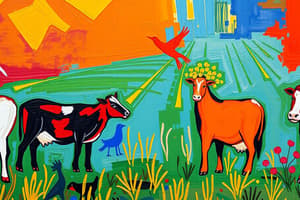Podcast
Questions and Answers
What were the animals working during Chapter 6?
What were the animals working during Chapter 6?
- Sixty-hour week (correct)
- Eighty-hour week
- Forty-hour week
- Twenty-hour week
In Chapter 7, Napoleon frequently leaves the farmhouse.
In Chapter 7, Napoleon frequently leaves the farmhouse.
False (B)
What is the new rule added in Chapter 8 about killing other animals?
What is the new rule added in Chapter 8 about killing other animals?
No animal shall kill any other animal without cause.
What does Squealer say to convince the animals in Chapter 9?
What does Squealer say to convince the animals in Chapter 9?
Boxer believes he will be allowed to retire, but he is taken away in a wagon belonging to the ______.
Boxer believes he will be allowed to retire, but he is taken away in a wagon belonging to the ______.
What new slogan do the sheep learn in Chapter 10?
What new slogan do the sheep learn in Chapter 10?
By Chapter 10, the animals who participated in the Rebellion are mostly still alive.
By Chapter 10, the animals who participated in the Rebellion are mostly still alive.
What commandment do the pigs change in Chapter 10?
What commandment do the pigs change in Chapter 10?
Study Notes
Chapter 6
- Animals endure a sixty-hour workweek, believing they toil for their benefit.
- Crops suffer due to windmill construction delays; Boxer works harder, rising earlier.
- Pigs begin trading with humans for supplies, contradicting previous commandments.
- Squealer manipulates the interpretation of rules regarding beds and sheets.
- After a storm destroys the half-built windmill, Napoleon blames Snowball and insists on rebuilding.
Chapter 7
- Animals face a harsh winter while rebuilding the windmill, with food scarcity prevalent.
- Napoleon, rarely seen, utilizes Squealer to convey messages and manipulate perceptions.
- Hens rebel against egg production demands, resulting in harsh punishments and deaths.
- Snowball is scapegoated for all problems; dissent is met with violent retribution from Napoleon's dogs.
- Squealer abolishes "Beasts of England," claiming it is no longer needed for a attained revolution.
Chapter 8
- The sixth commandment is altered to justify killings among animals.
- Despite harsh conditions, Squealer falsely assures animals of progress using flawed statistics.
- Napoleon enjoys luxury, including exclusive dining and personal bodyguards, while the animals toil.
- Windmill is completed, only to be destroyed by Frederick’s men using counterfeit payment.
- Napoleon's health declines after a drinking binge, leading him to further alter commandments to suit the pigs' desires.
Chapter 9
- Boxer works tirelessly despite injuries from battle; conditions for animals worsen.
- Squealer reassures animals, feeding them false statistics about their well-being.
- Napoleon plans a school for pigs, while others are kept in ignorance.
- Boxer collapses but is misled about his future; the wagon sent for him belongs to a slaughterer.
- Squealer deceives animals about Boxer's death and exploits the situation for a celebration, where the pigs indulge.
Chapter 10
- Many original animals from the Rebellion have died; new animals are unaware of the farm's history.
- Farm prosperity is maintained, but original promises of comfort remain unfulfilled.
- Animals cling to the hope of Old Major's vision despite suffering.
- Pigs begin walking on two legs, prompting outrage, but sheep drown out protests with new slogans.
- The only remaining commandment states, "All animals are equal but some animals are more equal than others."
- The farm's name reverts to Manor Farm, blurring the lines between pigs and humans as they adopt similar behaviors and appearances.
Studying That Suits You
Use AI to generate personalized quizzes and flashcards to suit your learning preferences.
Description
This quiz focuses on the summaries of chapters 6 to 10 of George Orwell's 'Animal Farm'. It highlights key events such as the animals' hard work, the construction of the windmill, and the pigs' dealings with neighboring farms. Test your understanding of these crucial chapters.




